5 things to note from the Marriage, Family & Social Discourse survey by Cultivate SG
by Gracia Chiang // November 19, 2024, 4:39 pm

Many Singaporeans still hold positive views towards marriage and family, but the findings of a recent survey suggest that a sizeable number of younger women are dissatisfied with existing norms. Photo from Depositphotos.com.
While Singaporeans largely continue to see marriage and family in a positive light, there are noticeable differences in views among men and women as well as across age groups.
This was one of the observations from a recent survey by Cultivate SG, a secular non-profit organisation that researches and dialogues on family issues in Singapore.
Recognising the shifting attitudes towards marriage and family, and the potentially sensitive nature of these topics in social discourse, Cultivate commissioned a survey to better understand local sentiments.
The online questionnaire was completed by 2,000 Singapore Citizens and Permanent Residents over the period of 21 September–21 October 2024. Results were also weighted to align with the demographic profile of Singapore’s population.
Presenting the results at their Unfiltered conference last week, Cultivate shared a number of key findings.
1. Most view marriage and family positively, but younger women are less in favour compared to their male counterparts
Institution of marriage
Close to 8 in 10 respondents (78%) believe that the institution of marriage is beneficial to society.
However, older respondents are more likely to hold this view (over 8 in 10 for those aged 45 and above) compared to the youngest age group (7 in 10 for those aged 18–24).
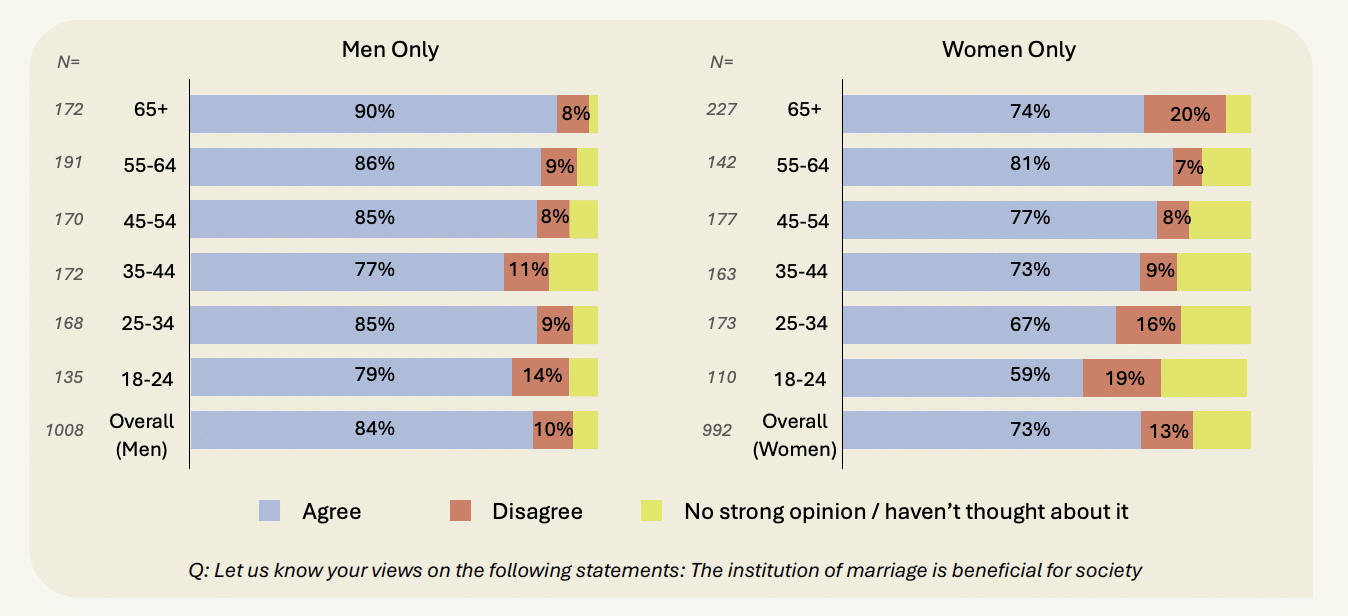
Overall, more men (84%) than women (73%) feel that marriage is beneficial for society.
It is also worth highlighting that younger women aged 18–24 have the least favourable view, with only 59% agreeing with the statement. This stands in contrast to their male peers, where 79% agreed.
Definition of marriage as a legal union between a man and a woman
There is strong support for the existing definition of marriage to remain, with 78% agreeing with the statement. However, men (82%) are again more likely to hold this view than women (74%).
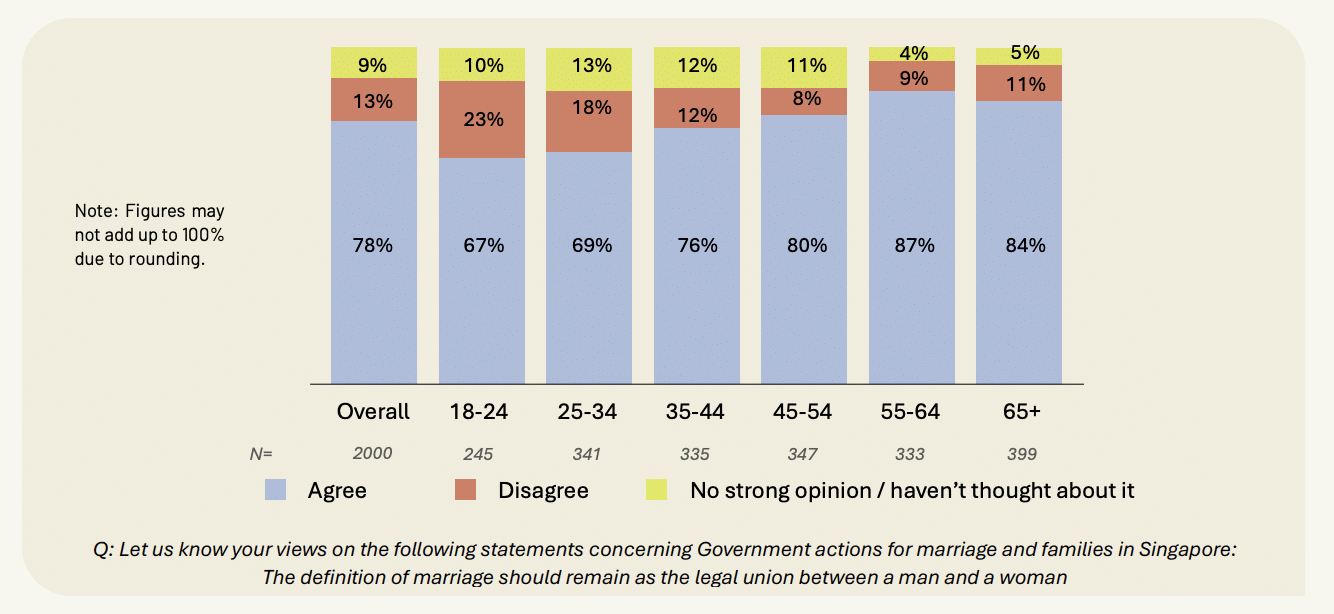
Younger respondents are also less likely to agree (67%) that the current definition should stay.
Taking a closer look at the young respondents, the report also found a divergence among the sexes – only 56% of younger women aged 18–24 agree with the current definition as compared to 76% of their male counterparts.
Aspirations for marriage
From the survey, younger women aged 18–24 seem to have considerable interest in getting married (75%), which is roughly on par with the men of their age group (77%).
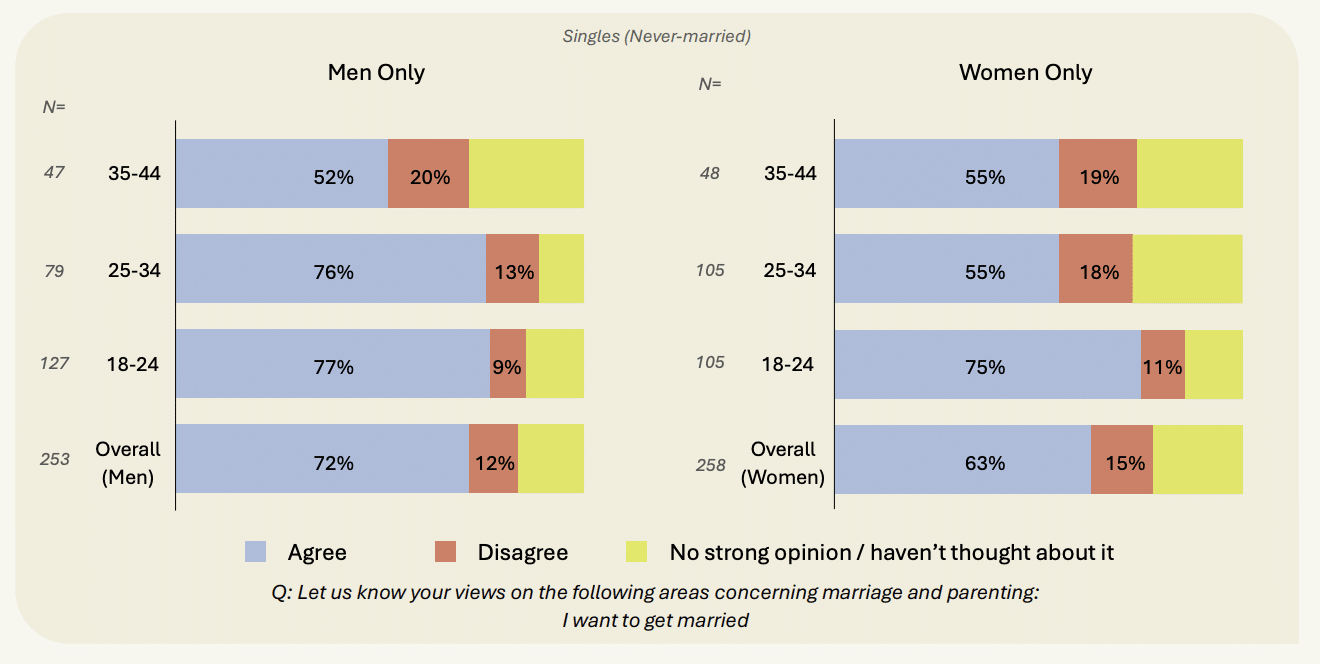
Interestingly, aspirations for marriage for women aged 25–34 (55%) are much lower compared to their male counterparts in the same age group (76%).
Responding to the differences in views between men and women on marriage, Darius Lee, Executive Director of Cultivate SG, said that the survey did not examine the reasons for this variance.
However, he believes that younger women may perceive marriage as a private matter rather than an institution which benefits society.
“Thus, we find that younger women aged 18–24 still aspire to get married at similar levels to their male counterparts, even though they are less likely to agree that the institution of marriage benefits society,” explained Darius.
Nonetheless, he felt that it was important for Singaporeans to rediscover the value of marriage and family.
“While these are personal matters, they are also social institutions forming the basic building block of society,” said Darius.
“When marriage and family thrive, society thrives too.”
2. The majority have positive attitudes towards children, but there are many unfulfilled parenthood aspirations
Place of children in society
Around 7 in 10 respondents (69%) believe that Singapore will be better off with more children.
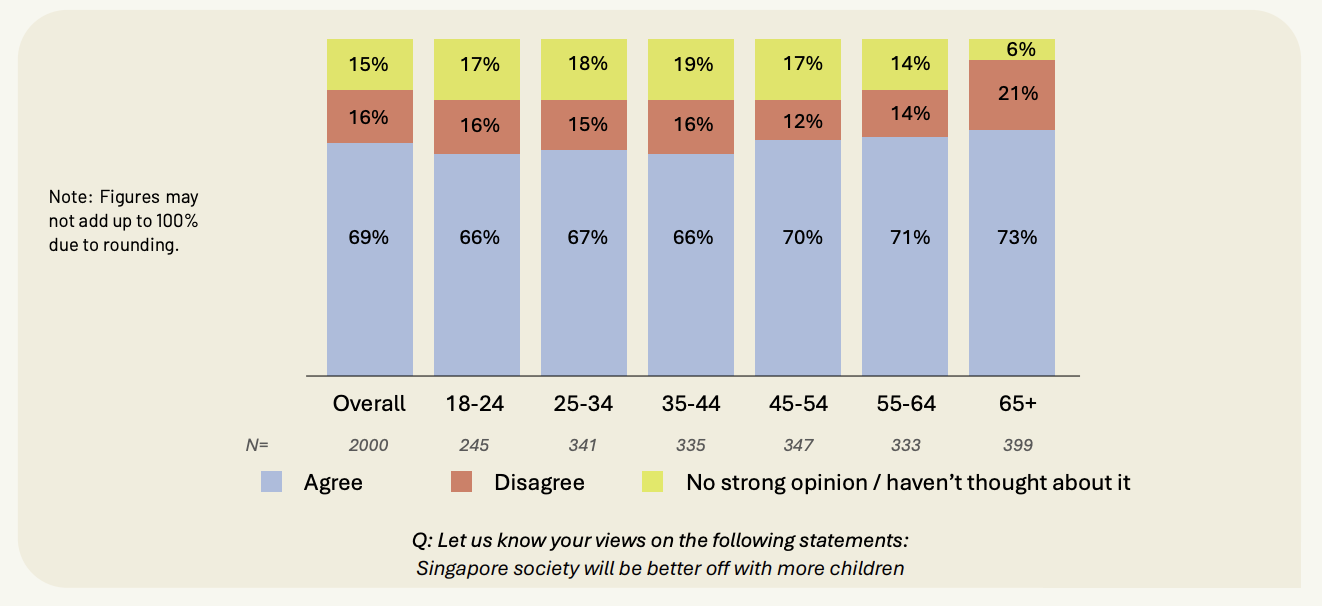
Older respondents are again more likely to agree with this statement.
There is also a difference in views between men (75%) and women (63%).
The gap is biggest among the youngest age group, with only 56% of women aged 18–24 agreeing that Singapore will be better off with more children, as compared to 75% of their male counterparts.
Aspirations for parenthood
While the median ideal and the planned number of children is 2, about half (51%) of the married respondents currently only have 1 or 0 children.
Almost half of the married respondents aged 18-44 also have not had the number of children they think would be ideal to have (49%) or planned to have (58%).
Hence, one of the recommendations by Cultivate was for more research to understand why a significant number of married couples did not achieve their ideal or planned number of children, so that suitable support can be given.
No desire for children – a dealbreaker?
The survey also sought to understand whether respondents would consider a potential spouse’s refusal to have children to be a dealbreaker in marriage.
About half the respondents (51%) reveal that they will not marry or would not have married someone who does not want to have children, with the oldest age group being in greatest agreement.
Never-married respondents are less likely to agree, with only 40% indicating this.
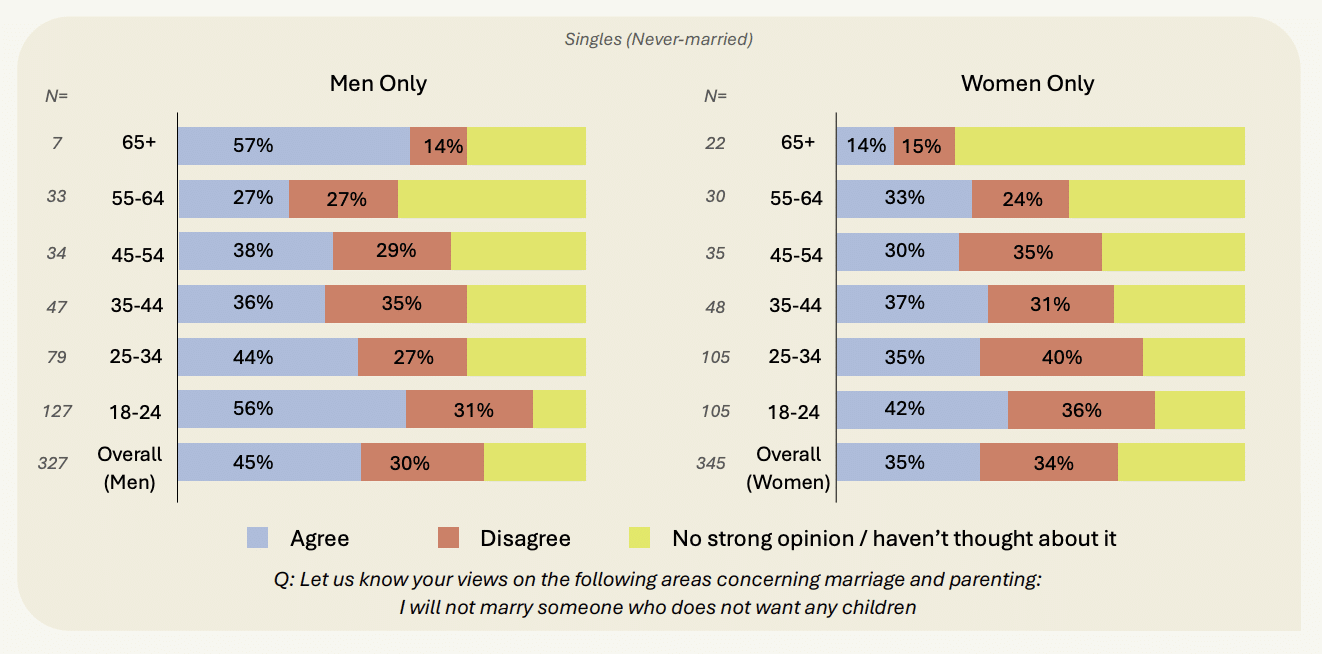
There is also a gap in sentiments among never-married men (45%) and women (35%), with this difference being most obvious in the youngest age group.
Again, this shows a divergence in attitudes among younger women compared to their male counterparts not just on marriage, but also on parenthood.
Darius suggested that this could be because caregiving tends to be perceived as a mother’s role, while fathers are commonly thought of as breadwinners.
“Women may feel that they sacrifice or contribute more than men in the context of marriage and parenting, having to give up their careers or find some way to juggle work and childcare,” he explained.
This was also one of the findings in Cultivate’s Parenthood and Work Survey that was conducted earlier this year.
“To be fair, more men in my generation are stepping up, and I have seen many fathers my age actively caring for their young children,” observed Darius.
“I also see many grandfathers actively bringing grandchildren out, driving them to and from school, and more.”
But we can encourage more men to be actively involved in the caregiving of children, he added.
3. Most agree that fathers and mothers play important roles in the lives of children
Cutting across age groups and sexes, an overwhelming number of respondents (nearly 9 in 10 or 89%) feel that men and women each bring unique contributions to parenting.
When asked whether they believe that a child needs a father and a mother, most also replied favourably (83%), with some differences among men and women.
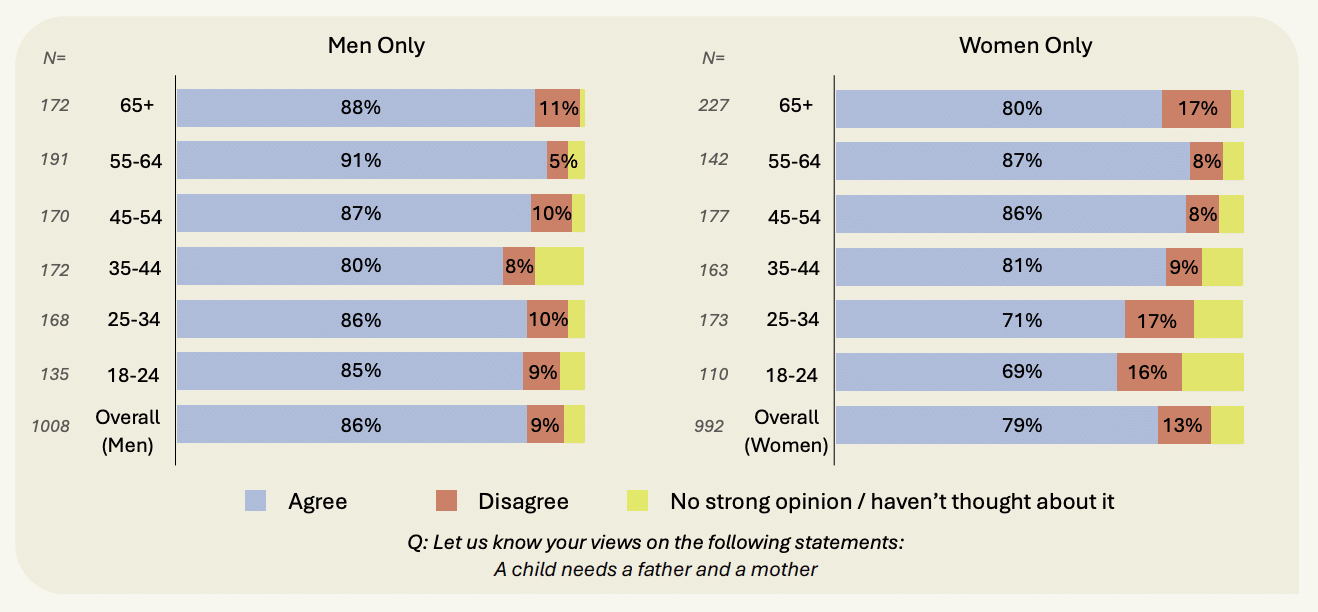
For younger women (18–34), the percentage of respondents who agreed that a child needs a father and a mother was lower. The figure is higher among younger men.
Reflecting these attitudes on the importance of both parents, only about 1 in 4 respondents (24%) believe that single parenting should be encouraged.
However, the report also highlights a difference in attitudes across the sexes on whether single parenting should be encouraged.
Among the younger respondents aged 18-34, women are almost twice more likely to agree that single parenting should be encouraged than their male counterparts, Darius pointed out.
“More women than men feel higher levels of sympathy towards single parents, also perhaps because women are overrepresented among single parents,” he surmised.
Nonetheless, it is also clear that Singaporeans draw a distinction between supporting single parents and encouraging single parenthood.
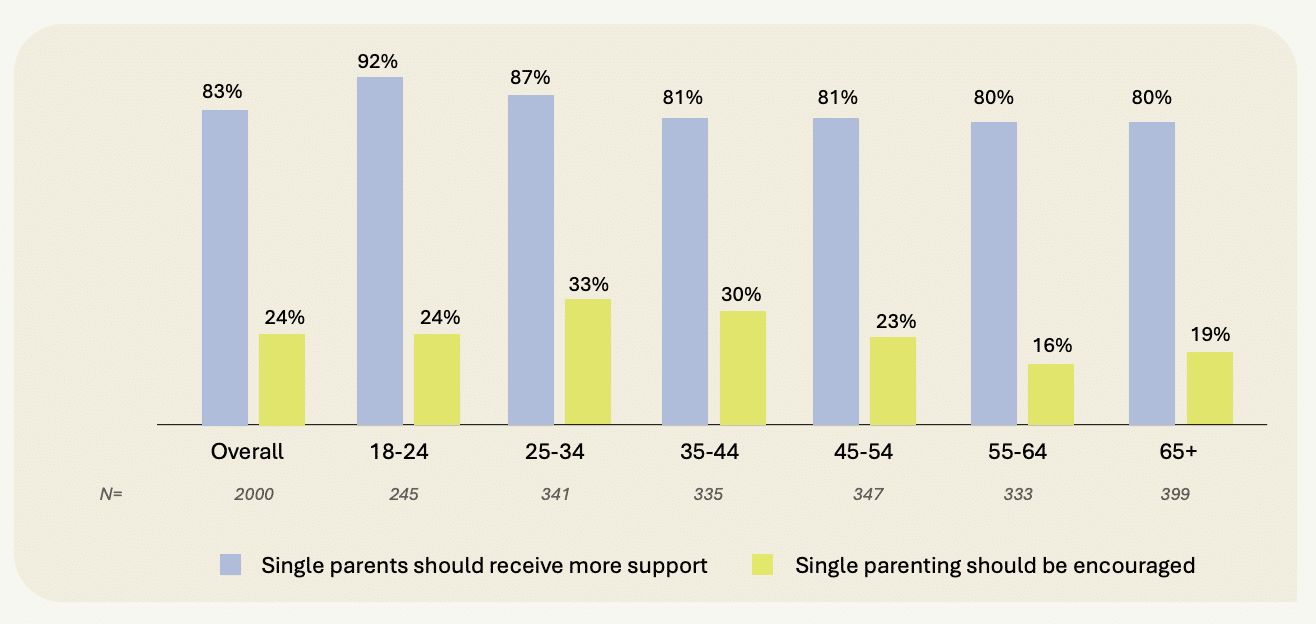
Singaporeans are compassionate towards single parents, with 83% believing that single parents should receive more support. However, only about 24% believe that single parenting should be encouraged.
Darius, too, agreed that it is needful to strengthen support systems for single parents, whether through families, religious organisations, community groups or other networks.
“When either parent is absent for any reason, children should nevertheless be given the best possible chance to succeed. This includes supporting them and their single parents,” he said.
4. Parents recognise the contributions of grandparents in caregiving, but don’t necessarily want them to be involved in raising their children
Despite most respondents (80%) agreeing that grandparents bring important contributions to caregiving, fewer (69%) desire for their parents to be involved in the raising of their children.
Zooming into the answers by respondents’ sex, results also show that women are less likely than their male counterparts to want their parents to be involved in raising their children.
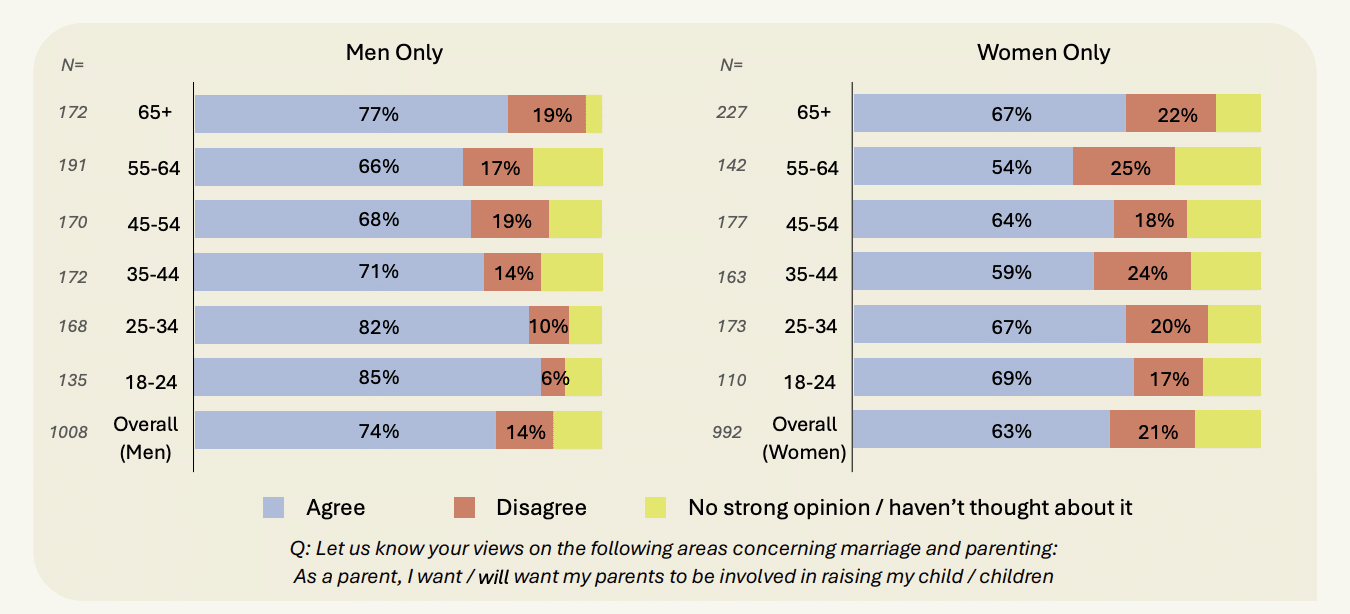
Among women of all age groups, 63% expressed such desires, as compared to around 74% among men of all age groups.
While the survey did not dive deeper into the reasons why women may feel this way, the report’s authors note that “research has pointed to differences in values and attitudes, as well as potential for conflict between parents and grandparents concerning parenting styles”.
In an earlier survey on parenthood and work, Cultivate also found that grandparents are the third most common main caregivers during working hours on weekdays (15%), behind mothers (44%) and institutionalised childcare (21%).
Further study may be needed to explore the reasons why some parents do not want their own parents to be involved in raising their children.
5. Dialogue across controversial views is possible, but many engage in self-censorship
Finally, the survey explored if Singaporeans are willing and able to dialogue with others who do not share their views, especially since issues relating to marriage, family and children are very personal.
While it is heartening that respondents largely believe that friendships across controversial views (67%) and dialogues across opposing views are possible (74%), almost 6 in 10 (58%) report self-censorship due to the fear of public criticism.
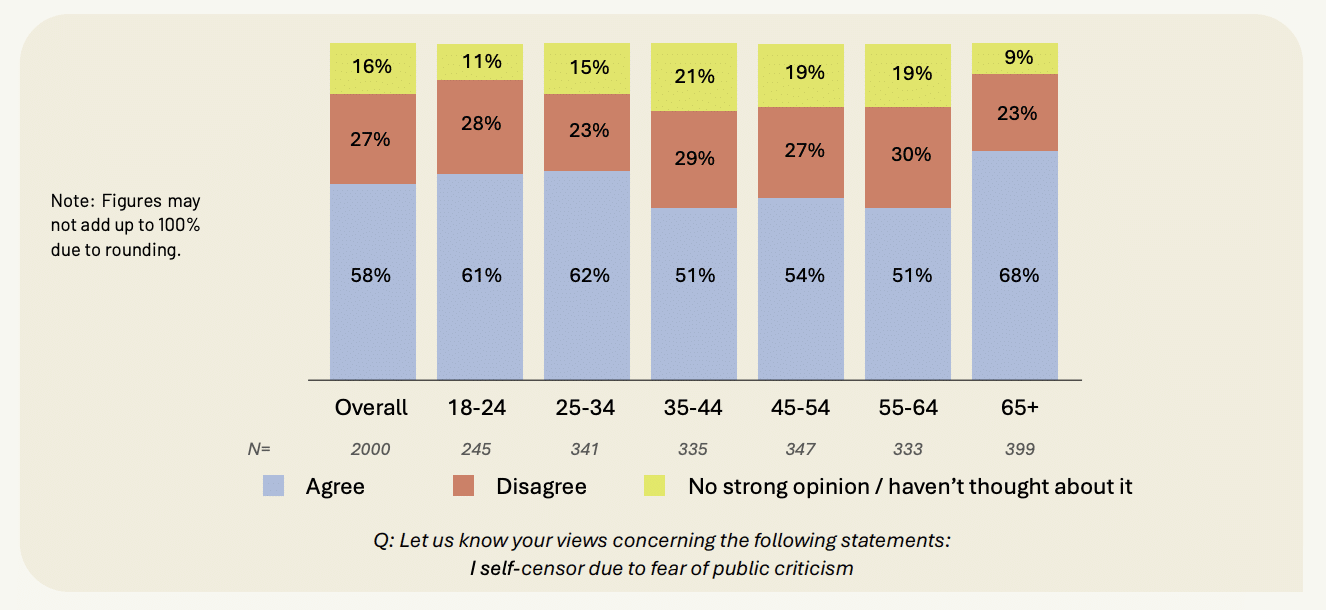
The concern of self-censorship is higher among the younger age groups of 18–24 (61%) and 25–34 (62%) as well as those aged 65 and above (68%).
Quite worryingly, the report also found that a sizeable number of respondents are favourable towards forms of social sanction against people for expressing views that they do not agree with.
Over 1 in 3 respondents (36%) say that it is acceptable to shame someone online, while more than 1 in 3 (37%) say that it is acceptable to call for someone to be fired by employers.
To address these attitudes, Cultivate recommends several measures, including a dedicated agency to act swiftly against online harms as well as greater protection for individuals and groups in the face of cancel culture.
Creating room for more conversations
Reflecting on the differences in views across age groups that was observed in the survey, Darius said: “Some people say that younger respondents may eventually ‘grow out’ of their less positive attitudes towards marriage and family as they mature.
“For some people, that may well be true, because getting married and becoming a parent are transformative experiences that do shift priorities for people. However, there would also be others who do not change in their views as they grow older.”
Such differences can also be a cause of concern because they can lead to intergenerational tensions and divisions.
“To Cultivate as an organisation, this means that we need to have better conversations across different generations about attitudes towards marriage and family, and to collectively build a culture where the family and nation can thrive,” he elaborated.
For the full report, which includes additional findings relating to views on sex, marriage, parenting and family life, do visit Cultivate’s website.
You can also look out for other stories in the coming days, where we will be sharing more insights from panellists at Cultivate’s Unfiltered conference, as well as a new campaign that aims to strengthen intergenerational bonds.
RELATED STORIES:
Building a “home” for youths in the streets and sports courts of Henderson estate
“The first time we held hands was after we got engaged”: Deputy Minister Hannah Yeoh’s love story
We are an independent, non-profit organisation that relies on the generosity of our readers, such as yourself, to continue serving the kingdom. Every dollar donated goes directly back into our editorial coverage.
Would you consider partnering with us in our kingdom work by supporting us financially, either as a one-off donation, or a recurring pledge?
Support Salt&Light


